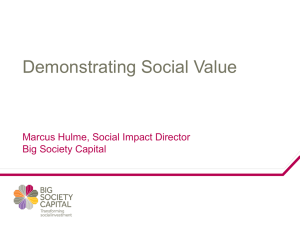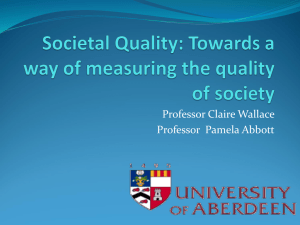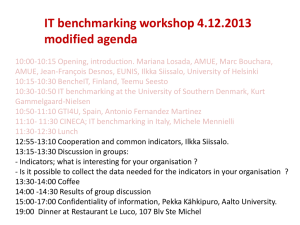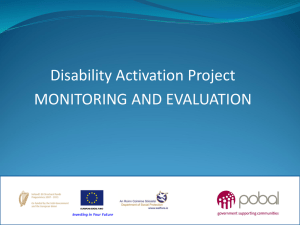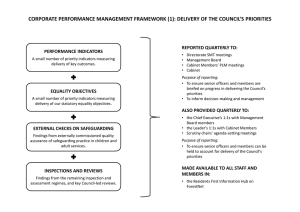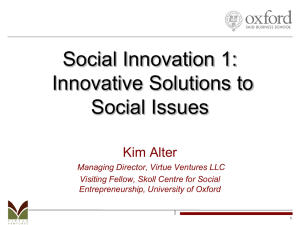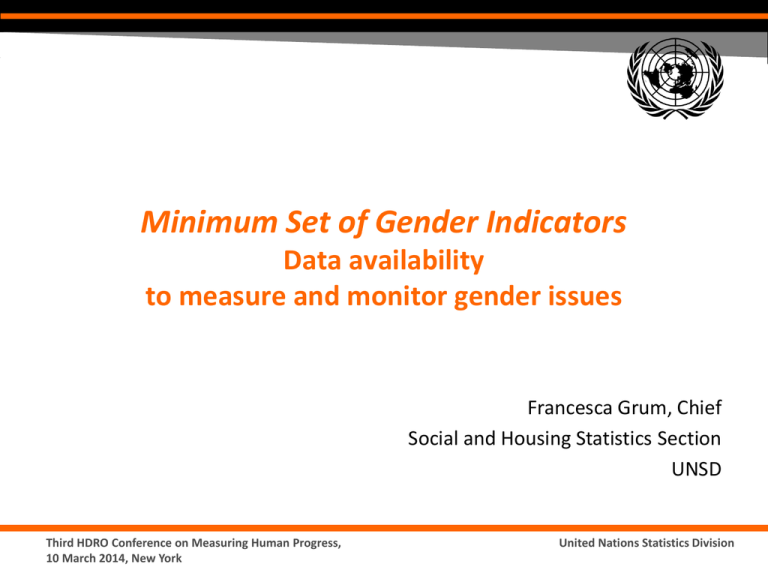
Minimum Set of Gender Indicators
Data availability
to measure and monitor gender issues
Francesca Grum, Chief
Social and Housing Statistics Section
UNSD
Third HDRO Conference on Measuring Human Progress,
10 March 2014, New York
United Nations Statistics Division
Global Gender Statistics Programme
Mandated by the
UN Statistical Commission
Coordinated by the
Inter-agency and Expert Group
on Gender Statistics IAEG-GS
Implemented by the
UN Statistics Division/key
partners
Third HDRO Conference on Measuring Human Progress,
10 March 2014, New York
United Nations Statistics Division
Minimum Set of Gender Indicators
@ unstats.un.org/gender/data
United Nations Statistics Division
Third HDRO Conference on Measuring Human Progress,
10 March 2014, New York
United Nations Statistics Division
Background
• Internationally-agreed indicators to monitor gender equality
and women’s empowerment (IAEG-GS 2011 and UN Statistical
Commission 2013)
– Gender indicators (52)
– Gender indicators related to national norms (11)
• Five domains
– Economic structures, participation in productive activities and
–
–
–
–
access to resources
Education
Health and related services
Human rights of women and the girl child
Public life and decision-making
Third HDRO Conference on Measuring Human Progress,
10 March 2014, New York
United Nations Statistics Division
Organization of indicators in Tiers
Tier I
• Indicators conceptually clear, with an agreed international
definition and regularly produced by countries
International data compilation
Tier II
• Indicators conceptually clear, with an agreed international
definition, but not yet regularly produced by countries
Promoting capacity building activities
Tier III
• Indicators for which international standards need still to be
developed and not regularly produced by countries
Methodological developments – e.g., EDGE project
Third HDRO Conference on Measuring Human Progress,
10 March 2014, New York
United Nations Statistics Division
Gender data platform
• Improve access to data and methods
• Launched at CSW, 12 March 2014
• Contribution from 14 partner agencies
Third HDRO Conference on Measuring Human Progress,
10 March 2014, New York
United Nations Statistics Division
Data availability Tier I indicators (35 inds)
Average number of countries with
data, by area
Indicators, by number of data points,
1990-2012
144
Average # countries
data are available for
Third HDRO Conference on Measuring Human Progress,
10 March 2014, New York
United Nations Statistics Division
Tier II (some data available + agreed int’l definition)
promoting capacity building
– Focus of work on:
Violence Against Women (VAW),
Time Use Statistics (TUS)
Third HDRO Conference on Measuring Human Progress,
10 March 2014, New York
United Nations Statistics Division
Violence against Women: Data availability
Type of survey for statistics on VAW
50
45
Number of surveys
40
35
30
25
20
15
10
5
0
DHS
WHO
IVAWS
RHS
Other
Type of survey
Total number of surveys included = 121
Total number of countries with (some) data = 80
Third HDRO Conference on Measuring Human Progress,
10 March 2014, New York
9
United Nations Statistics Division
Number of SURVEYS conducted on VAW since 2000 by type of violence covered
120
120
100
100
80
80
60
60
Both (Physical and Sexual)
Both (Physical and Sexual)
Sexual Violence
Sexual Violence
40
Physical Violence
40
20
20
0
Physical Violence
0
Last 12 months
Lifetime
Intimate partner violence
Third HDRO Conference on Measuring Human Progress,
10 March 2014, New York
Last 12 months
Lifetime
Intimate Partner and/or Non-Partner Violence
United Nations Statistics Division
TUS: Data availability
TUS since 1990:
• 185 surveys/studies on time use conducted worldwide
→92 (50%) in “countries in developing regions”
→93 (50%) in “developed countries”
• In total 85 distinct countries:
→28 “developed countries”
→57 “developing countries”
http://unstats.un.org/unsd/demographic/sconcerns/tuse/default.aspx
Third HDRO Conference on Measuring Human Progress,
10 March 2014, New York
United Nations Statistics Division
Tier III = EDGE project –
Evidence and Data for Gender Equality
Third HDRO Conference on Measuring Human Progress,
10 March 2014, New York
United Nations Statistics Division
EDGE Project
A 3-year initiative (UNSD and UN Women)
Overall objective:
Improving the integration of gender issues into the
regular production of official statistics for better
evidence-based policies
1
2
3
Guidelines for comparable gender
indicators on entrepreneurship and
asset ownership
Results of pilot testing in
selected countries
Health
Education
Employment
International platform for data and
metadata on health, education and
employment
Third HDRO Conference on Measuring Human Progress,
10 March 2014, New York
United Nations Statistics Division
http://unstats.un.org/unsd/gender/default.html
Third HDRO Conference on Measuring Human Progress,
10 March 2014, New York
United Nations Statistics Division




